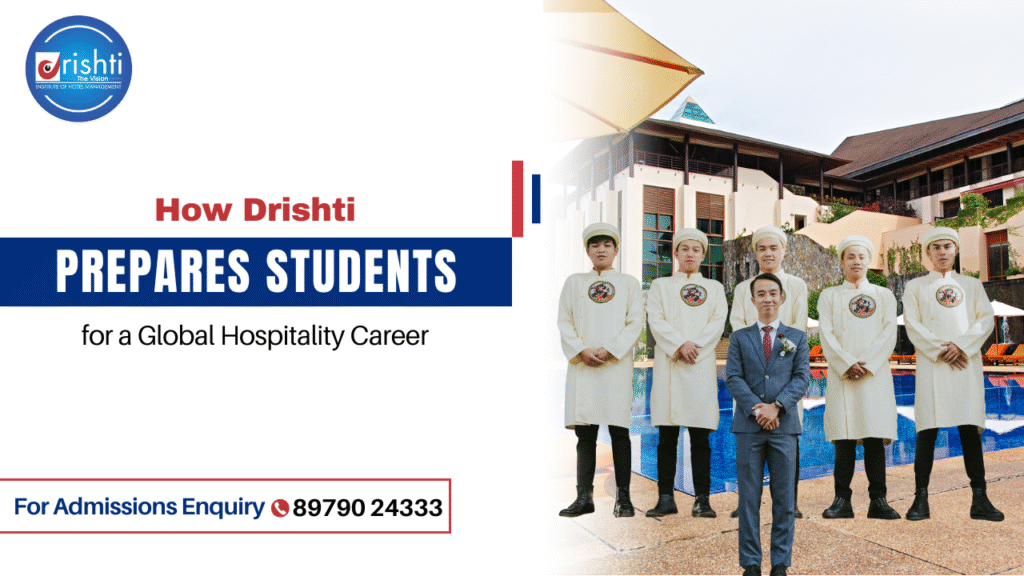How to Become a Chef After 12th in Haldwani?
Aaj kal ghar baithke khana banana toh sab seekh lete hain, lekin professional chef banne ka safar alag hi hai. 12th pass karke agar aapko cooking ka shauk hai aur Haldwani mein rehkar career banana chahte ho, toh yeh guide aapke liye perfect hai. India mein hotel industry tezi se badh rahi hai, aur Uttarakhand jaise sheheron mein tourism boom ki wajah se chefs ki demand badh gayi hai. Haldwani ek hub ban gaya hai hospitality training ka, kyunki yahan se Nainital, Jim Corbett jaise tourist spots paas hain. Drishti Institute jaise top places yahan practical training dete hain jo real kitchen mein kaam aati hai. Is article mein hum step-by-step batayenge kaise shuru karo, kya courses karo, skills sikho, jobs pao aur paise kitne kamao. Yeh sab natural tareeke se, bilkul simple Hinglish mein, taaki aap easily samajh sako. Chef Banane Ka Pehla Kadam: Apne Interest Ko Samjho Chef banna ek serious decision hai, sirf khana banana pasand hai ye kaafi nahi hai. Aapko sochna hoga, aap kitchen mein lambe samay kaam kar sakte hain? Chef ka kaam kaafi demanding hota hai – kabhi-kabhi raat ko bhi kaam karna padta hai aur holidays pe bhi busy rehte hain. Lekin isme creativity use karne ka mauka milta hai aur naye-naye dishes try karne ka mazaa bhi aata hai. Agar aapko naye swaad banana, dusre logon ko khush karna aur teamwork pasand hai, toh yeh career aapke liye sahi hai. Humesha yaad rakho, chef banna sirf ek naukri nahi hai – yeh dedication chahta hai aur kabhi-kabhi struggles bhi karne padte hain. Lekin agar aap passionate ho, seekhne ke liye ready ho, toh yeh career aapke liye kaafi rewarding ban sakta hai. Agar haan, to aage badho. Warna socho hospitality ke dusre fields mein, jaise hotel management. Culinary arts yeh term jaano, iska matlab professional cooking hai. Also read: Specialized Diploma in Food Production: Your Gateway to Culinary Excellence Eligibility: 12th Ke Baad Kaun Course Kar Sakte Ho? 12th kisi bhi stream se pass ho (commerce, arts, science sab chalega). Age 17-25 ideal hoti hai entry level ke liye. Kuch institutes mein entrance test hota hai, jaise basic cooking knowledge ya interview. Yahan table dekho eligibility ka: Requirement Details Education 12th pass kisi bhi stream se Age 16 saal se upar Skills Cooking ka basic gyaan accha Fees (approx) ₹25,000 se ₹1 lakh tak Drishti Institute Haldwani mein direct admission milta hai, merit basis pe. [chef course Haldwani] ke liye abhi contact karo: Specialized Diploma in Food Production. Top Chef Courses Haldwani Mein: Kaun Sa Chuno? Agar aap 12th pass kar chuke hain aur cooking aapko pasand hai, toh Haldwani mein kaafi ache chef courses mil jaate hain. Yeh courses practical training par focus karte hain, matlab aap real kitchen mein seekhenge, sirf theory nahi. Inmein admission lena easy hai aur fees bhi reasonable hoti hai. Haldwani mein kai options hain. Short diploma se leke degree tak. Beginners ke liye 6 months ka certificate best hai, jaldi job mil jati. Best chef institute Haldwani Drishti jaise jagah 70% practical training deta hai mock kitchens mein. Short Courses (3-6 Months): Longer Courses (1-3 Years): Table of popular courses: Course Name Duration Fees (₹) Placement Help Professional Chef Cert. 6 months 35,000 Yes, 100% Culinary Diploma 1 year 70,000 Taj/Oberoi Bakery & Pastry 3 months 25,000 Local hotels Haldwani ke institutes jaise Drishti Institute, Hotel School, aur Pal College apne courses mein real kitchen experience, industry internships, aur placement support bhi dete hain. Joining a chef course after 12th is a great way to start a rewarding career in hospitality. Course Curriculum – Kya Sikhte Ho? Haldwani mein chef course join karne ke baad aapko basic se advance tak sab practical skills milte hain. Pehle din se hi real kitchen environment milta hai, jahan chef ki uniform pehna kar ingredients cut karna aur tools handle karna sikhaya jaata hai. Khana banana sirf recipe follow karna nahi, yeh discipline aur hygiene ka bhi game hai. Main Cheezein Jo Aap Sekhenge Aapko teamwork, communication, aur time management ki bhi practice hoti hai, kyunki kitchen mein har kaam team mein hota hai. Drishti Institute jaise places live orders pe kaam karna sikhate hain, jo actual restaurant ya hotel ki job ke liye best prep hai. Aur detail mein dekho toh aapko seasonal dishes, regional cuisines, aur healthy meal planning bhi sikhai jaati hai. Yahi sab real chef banne ka strong foundation hai. Best Institutes Haldwani Ke: Drishti Kyun Top? Drishti Institute Haldwani hotel management aur chef banne ke liye sabse top institutes mein se hai. Sabse badi wajah yeh hai ki yahan faculty kaafi experienced hai aur practical training par full focus diya jata hai. Students ko real kitchen environment milta hai jahan pe woh khud se international level ki recipes banate aur seekhte hain. Drishti Institute ki fees reasonable hai, saare modern facilities available hain jaise state-of-the-art labs, hygienic hostel rooms aur supportive placement cell. Yahan se pass out hone wale students Taj, Radisson, Oberoi jaise five-star hotels me placement le chuke hain. Placement assistance ke sath-sath, courses bhi flexible hain—Diploma in Food Production, B.Voc Hotel Management, Hospitality aur Aviation, har ek ke liye specialized programs milte hain, jisme latest industry trends aur career counseling bhi hota hai. Institute ka campus friendly aur safe environment deta hai, individual attention milti hai, aur industrial visits regular hote hain jisse students ko real world ki exposure milti hai. Isi wajah se Drishti ko Haldwani aur poore Uttarakhand me best hotel management aur culinary arts institute maana jata hai. Skills Jo Chef Ban-ne Ke Liye Chahiye Chef banne ke liye sirf khana banana hi nahi, bohot saari dusri skills bhi kaam aati hain. Agar aap professional kitchen mein kaam karna chahte ho toh yeh sab skills zaroor zaroori hain: Agar aap yeh basic skills practice karte rahenge toh professional chef ke saath-sath log bhi aapke kaam ki tareef karenge. Practical Training Aur Internship: Real Kitchen Experience Theory se zyada important hai hands-on. Haldwani institutes mock hotels banate hain. 6 months course mein











